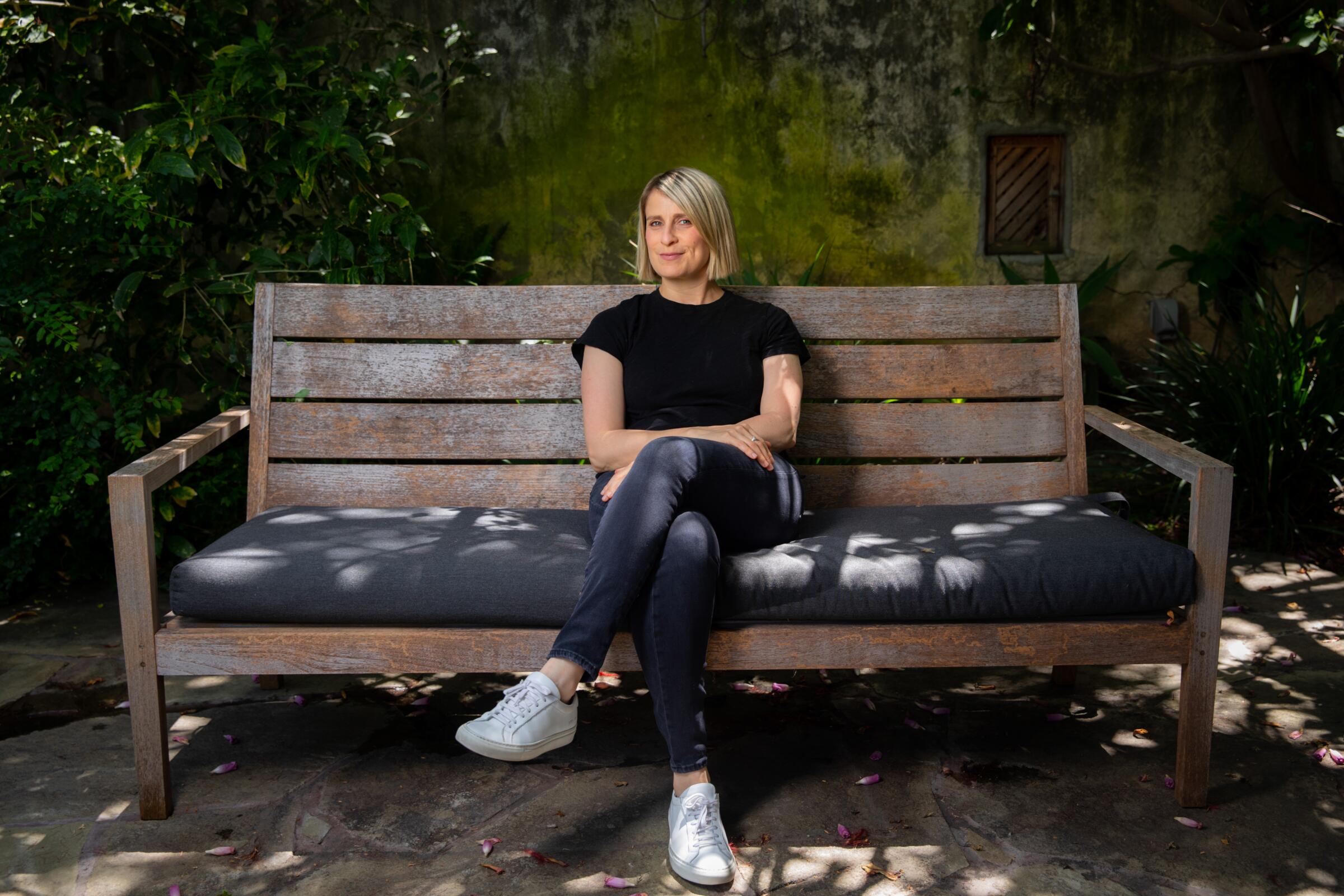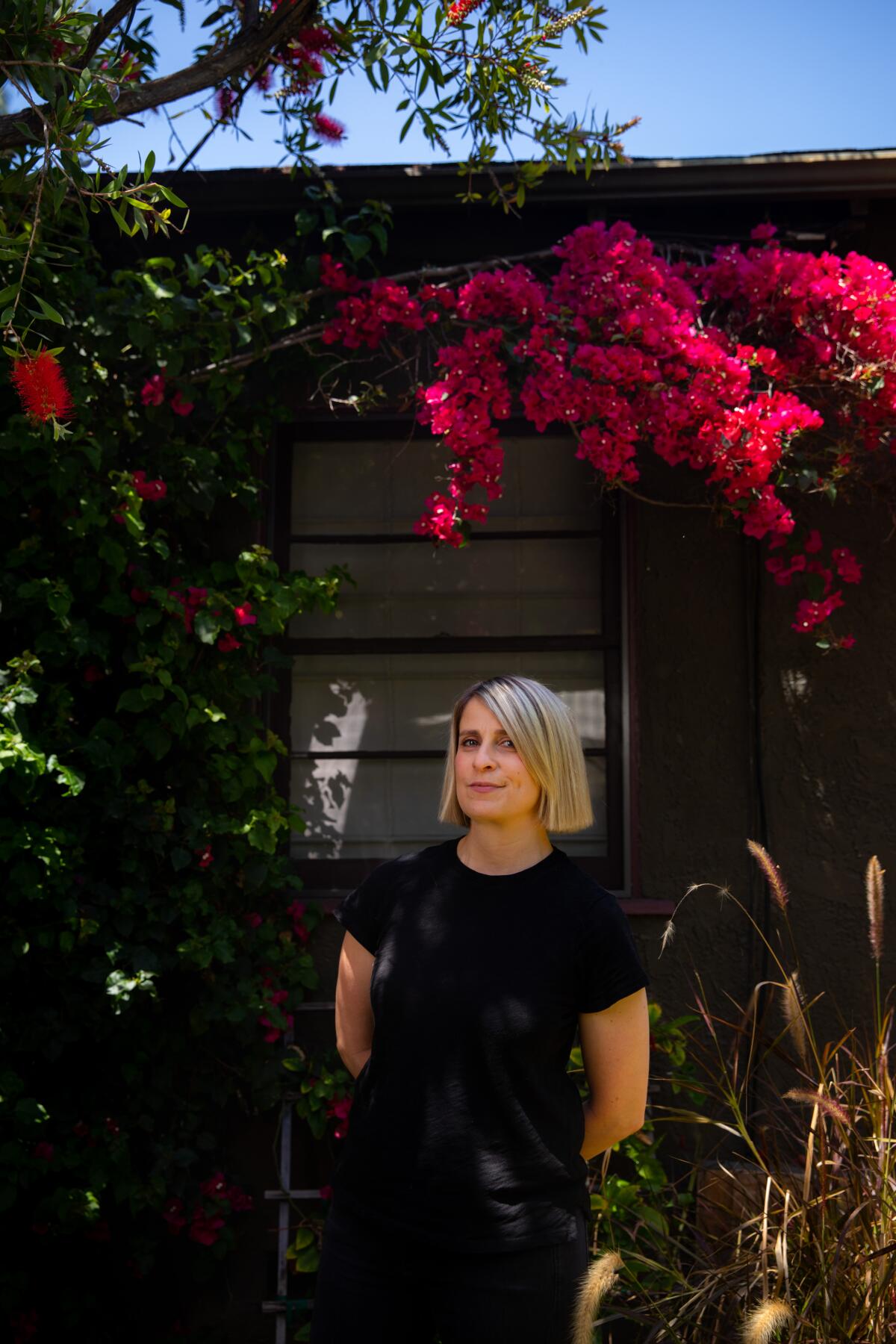The complete guide to home viewing
Get Screen Gab for everything about the TV shows and streaming movies everyone’s talking about.
You may occasionally receive promotional content from the Los Angeles Times.

This feature contains spoilers from the new season of Netflix’s “Dead to Me.”
It’s been however many days since she began sheltering at her Los Angeles home — really, who can keep track anymore? —and Liz Feldman, the creator and showrunner of Netflix’s “Dead to Me,” hasn’t been writing.
OK, maybe emails and texts.
She had just wrapped finishing touches on the 10-episode sophomore season of the dark, twisty dramedy when the coronavirus-imposed lockdown went into effect.
“I’m in my reabsorption phase,” she says. “I’ve had some weird ideas where I’m like, ‘Oh, should I do this?’ and I can’t seem to motivate myself to do it.”
But she’s been keeping her TV muscle active — at least as a viewer. And for others like her, in need of fresh content to add to their queue, new episodes of “Dead to Me” are now available to stream.
Hear interviews with TV stars in the new L.A. Times podcast ‘Can’t Stop Watching.’
The first season chronicled the unlikely friendship between Jen Harding (Christina Applegate), a recent widow, and Judy Hale (Linda Cardellini), the woman who accidentally killed Jen’s husband in a hit-and-run. By the end, in a dark role reversal, Judy’s former fiancé, Steve (James Marsden), is killed by Jen and left floating in her swimming pool. It’s safe to say that the the best friends are still feeling death’s tight grip in Season 2.
“If the first season was about grief, loss, forgiveness, friendship,” Feldman says, “this season is very much about truth, consequences, guilt. And there are some other themes that I hope that people will just pick up on without me having to say.”
A former stand-up comedian, Feldman made her more permanent leap into TV writing in 2004. She’s written for “The Ellen DeGeneres Show” as well as comedies like “The Great Indoors,” “Hot in Cleveland” and “2 Broke Girls.” In 2015, her short-lived comedy “One Big Happy,” about a lesbian and her straight male friend who decide to have a baby together, aired on NBC.
Feldman talked with The Times over video conference at her home earlier this week — on her seventh wedding anniversary, no less. (“That’s actually where we got married,” she said, moving her laptop to capture her backyard. “We’re going to have dinner and a drink out there.”) Here’s what she had to say about her TV journey under self-quarantine, how the coronavirus is changing her mindset for “Dead to Me’s” future and the inspiration for her TV twists. The following has been edited for clarity and condensed.
If you were to tell your life as a story, it has a lot of ... crazy twists and turns. And some days do feel like a ridiculous comedy and almost like a French farce, where you’re dropping [things], someone’s knocking on the door and you’re not dressed. Then there are other days, where you can’t imagine you could get any more bad news. The formula of traditional storytelling is something good happens, something bad happens, something good happens — that’s a very common way to tell a story. In my experience, something good happens, something better happens, something ... terrible happens, and then it gets worse. It’s like you get Trump, and he doesn’t get impeached and now we’re all in a ... global pandemic that we’re ill prepared [for]. But that’s life, you know? So when you start to describe life like that, you’re like, “Oh, God, that’s true. It is twisty and turny and sort of genre-less, you know?” Genre-nonconforming, as I like to say.
Critic Lorraine Ali writes of seeing her immigrant upbringing in the San Fernando Valley reflected in the Mindy Kaling Netflix comedy ‘Never Have I Ever.’
I’m married to a woman and I just was longing to tell a story about two people getting together and not having to explain it or talk about it or discuss it. Don’t get me wrong, there’s real value in a coming out story. I’ve told mine several times in so many iterations. It just wasn’t a story I felt like I needed to tell. What I haven’t seen and I thought could be interesting was just somebody living their life, being attracted to somebody, going for it and it just not being a conversation. Because of all people, Judy has the capacity to love all people and that does not need to be explained.
If you watch the show and if you understand that character, she’s a walking, beating heart, you know? And she’s in a situation where she’s trying to start fresh in her life. She’s looking for something that feels different than it felt like with Steve. And she’s introduced to this woman [Michelle, played by Natalie Morales] and they have a simpatico connection pretty much from the beginning. And I very purposely cast a queer actress to play Michelle. And I just thought, “God, wouldn’t it be nice to not hang a lantern on it and not have to explain it?” Because when you see a straight relationship forming, it’s never explained. And I think just that’s kind of my political agenda, to say: “This is so normal. It doesn’t need to be explained or discussed or analyzed in any way.” She falls for this person and her best friend [Jen] is like, “You guys are great.” And I just thought it would be refreshing.
I really wanted to be authentic in my portrayal of a woman in grief. Having gone through my own grief, but also having watched and held the hands of other people going through theirs, anger feels like a fairly obvious reaction to grief. It’s on that spectrum of whatever that’s called ... [the five-stage] Kübler-Ross [model of grief]. With Jen, as I was writing the pilot, I realized, “Oh, she’s from New York. She’s a tough girl.” I’m from New York, I’m a tough girl. And grief has given her permission to drop that filter that we all have that makes us be a good girl.
Christina Applegate and Linda Cardellini, who star as unlikely best friends in Netflix’s “Dead to Me,” are cozied up on a sofa in a nook of a West Los Angeles hotel when the conversation quickly turns to baby weight and leaky boobs.
And I think the grief has eaten away at that filter for her and she has no choice. She has no superego left, right? It’s just purely her animal instinctual feelings at all times. I did get pushback about how I was writing this character. There was definitely fear around her being an angry woman. And what I’ve said in the past about it is that men are angry and they’re a lovable curmudgeon or they’re just like a demanding boss or they’re a dad. And when a woman is angry, she’s like immediately just a monster. We’re extremely lucky in that Christina Applegate portrays her absolutely brilliantly and with such grace and humanity, but I just sort of wanted to show that this is the color we have. Women get angry, and when we get angry, it’s ugly. But it feels good. And we have every right to that feeling.

What’s going on now is definitely coloring how I’m thinking about next season of “Dead to Me.” I had certain ideas that I was really excited about, but given sort of where we’re at just as a global community, I’m rethinking it because of the situation that we’re all in.
One of the great and fun challenges of writing the show is balancing dark and light. There are a lot of dark things that happen, but in a weird way, it’s still kind of an aspirational, kind of hopeful show, even surrounding all the death and betrayal. And so in thinking about that and knowing that right now we are living through this impossible, sad, unpredictable time, it’s making me sort of rethink what I was going to do so that it’s maybe more reflective of the kind of stuff that we all need, as opposed to just like an interesting flash-bang kind of thing...
As far as how production will be different, first and foremost, the comfort and safety of my actors and my crew in general is the most important thing. I’m always very mindful of what I’m asking the actors to do as we’re in the writers room imagining all the things that could potentially happen to these characters. I would never ask them to do anything that they’re uncomfortable with. But, of course, it feels very important to think about the limitations that we’re going to be up against. I’m hoping that where there’s a will, there’s a way.
James Marsden knows a thing or two about being pegged as the bad-guy love interest.
My wife and I were watching “American Idol” last night and I can’t remember exactly what the moment was, but I just got so choked up and I was so emotional. I think it was because one of the kids, before they started singing, said something about the situation that we’re all in and I just like became overwhelmed. I have like a good cry at least once a day, if not four or five times.
I feel like I’ve been on quite a journey with what I’ve been watching. When we first started quarantine, I went to a pretty dark place, television-ally speaking. I was watching a lot of true crime. I mean it sort of started with “Tiger King.” Obviously. I’m not immune. I watched it in one night. Then I went down this crazy rabbit hole where I watched “The Devil Next Door,” which is this really intense documentary about a potential Nazi. And then I watched [“Conversations With a Killer: The Ted Bundy Tapes”]. I sort of had to step back and sort of psychoanalyze myself, and I was like, “Oh, I’m watching things that are darker than what’s happening now.” Like, I’m reminding myself subconsciously that there have been worse things that humanity has had to deal with.
Then I went on a more hopeful bend and I watched Dr. Ruth’s documentary [“Ask Dr. Ruth”]. It’s wonderful, and it was not what I was expecting at all and it was really uplifting, but she then reminded me about the Holocaust. So I started watching a lot of things about the Holocaust. So it’s really been a journey over here in this house. We watched “Unorthodox” — loved it. Loved it. And now we’re just savoring “Homeland,” because my wife and I have been together 11 years, so the show is nearly the length of our relationship. We started watching it together and now we’re going to finish it together.
The complete guide to home viewing
Get Screen Gab for everything about the TV shows and streaming movies everyone’s talking about.
You may occasionally receive promotional content from the Los Angeles Times.